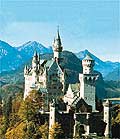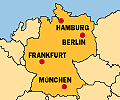Germany
“the European engine”
There are many faces to
Germany. There’s the modern, industrial Germany, the Germany of great
artistic and scientific traditions and the Germany of green rolling hills
and romantic old villages.
From the post war period and until today Germany (West Germany) has become
one of the world’s most developed and successful countries. It has made
enormous progress from having been bombed and reduced to poverty during
the war. German industry has been and still is leading, above all, when it
comes to electronics and cars.

Most exchange students
are placed in the 10th, 11th or 12th grade at high school. These three
grades are preparatory for university studies in Germany. You must have
studied German for at least three years in order to be able to study at a
German high school.
You will study Natural Science, Mathematics, German, Religion, and a
language, but there are also other subjects to choose among. In German
schools students work a lot in teams and discussions are very common.
Students are expected to air their opinion, show interest and take an
active part in teaching rather than learning things by heart. Being active
during lessons is just as important for a good grade as having excellent
results on the exams.
Students go to school Monday-Friday from 8 o’clock in the morning until
between 1 and 3 in the afternoon. You will have plenty of time to do your
homework. Depending on where in the country you are placed, you may also
go to school on Saturdays. Sundays are always free from school.
School start: from Mid August to Mid-September.(depends on the region you
are placed)
In addition to visits to
superb museums where you can see, read and above all hear Wagner or
Beethoven for instance, most Germans also like to engage in active forms
of recreation. Either by doing some team sport or perhaps at a fitness gym,
something that has become very popular lately.
After school when all the homework is done, you will most likely spend
time with your host family or friends. German youth often meet at each
other’s homes and watch videos or just talk. They also go shopping, to
the movies or go sporting together, for instance inline skating.
School offers some activities after school. Most spare time activities,
particularly certain sports, are generally arranged by a club (Verein),
that you can join. This is a good way of meeting new friends outside
school. As in many other European countries, soccer is the national sport
before others and there are local clubs all over the country.
Even though Germans are fond of socialising with their families and
friends, they also appreciate some time alone when they can listen to
music, read a book or just relax in peace and quiet.

During your exchange year
in Germany, you will not only have a new family, you will also get many
new friends, great experience and good self-confidence. Last but not least
you will also learn to speak German fluently. German is Europe’s second
most widely spoken language.
Spending time with your family is very important. During the week the
family tries to eat at least one meal together a day. At the weekend your
host family may go visit friends or relatives, for instance, or maybe go
for a car ride or go cycling together. Going to the theatre to watch a
play or to a museum are common weekend activities. Especially Sunday is
for taking it easy, relaxing and preparing for the coming work week.
German youth are often very independent and have more freedom than other
Europeans of their age when it comes to having a definite time to be home
and amusements like going to cafés or bars. Your host family will treat
you like an adult. This may mean more freedom than you are used to but
also more responsibility. It is very important that your host family can
trust you.
As a member of the family it goes without saying that you should help out
at home without being asked. For instance, you can take the dog for a walk,
do the dishes, or surprise your family with a culinary speciality from
your native country.
In Germany they are very particular about eating meals together, at least
once a day. Weekend pleasures are often visits to theatres or museums. But
it is also very common to go off to a city nearby or out into the thickly
foliaged woods. This may sound like a paradox; high-efficiency Germany is
not exactly known for its nature. But it is there and it is surprisingly
green.

Area: 356.733 square kilometers
Population: Appr. 81 million
Capital: Berlin
National Holiday: October 3
Celebrity: Autobahn
During several hundred
years Germany consisted of small independent states. Wilhelm I appointed
Otto von Bismarck as his Chancellor. Bismarck united Germany within a
decade. After 1871, Germany was united as the Second Reich with King
Wilhelm of Prussia as the emperor. The differences between the various
peoples were still considerably big.
After the Second World War Germany was divided into four occupied zones
which were controlled by the Soviet Union, Great Britain, the USA and
France. In May 1949 the Federal Republic of Germany was founded (West
Germany) by the areas that were controlled by France, Great Britain and
the USA. The Soviet-controlled part became GDR, the German Democratic
Republic (East Germany). After this, Germany was divided up in two
independent parts. In 1961 the Berlin Wall was built and this came to
symbolize the Cold War and its division of Europe.
In November 1989 the East Germans were demonstrating openly for their
political rights, in the aftermath of the collapse of the communistic
Eastern bloc. Since East Germany no longer had any support from the former
allies, the Soviet Union, the government had to give in to the demands of
the demonstrators. The decision to tear down the hateful Berlin Wall was
made and after this everything happened at a furious pace.
On October 3, 1990, the two states were reunited and became Germany once
more, and today Berlin is once again the capital. Still differences
between eastern and western Germany can be noted.

Nyitólap
I Újdonságok, akciók I Hol
találsz minket?
Jelentkezési lap I
Legjobb
Ár Garancia
www.iranyanglia.hu I
www.iranymalta.hu
BIG BEN Language Studies
Külföldi oktatási programok szakértője 1991 óta
Telefon:
06-1-318-5732, 06-30-513-4247
E-mail
Ügyfélfogadás:
1085 Budapest, Csepreghy u.4.
Előzetes időpont egyeztetés szükséges
Nyelvtanfolyamok,
nyelviskolai tanév,
szakmai gyakorlat, felsőoktatás külföldön